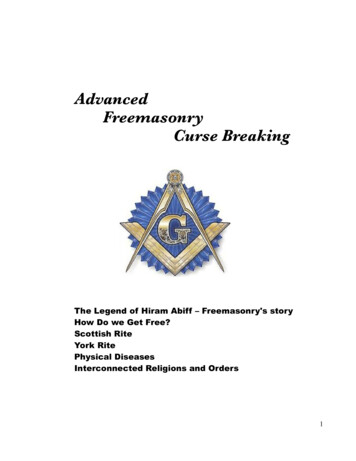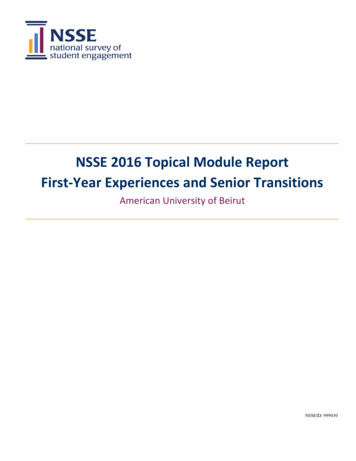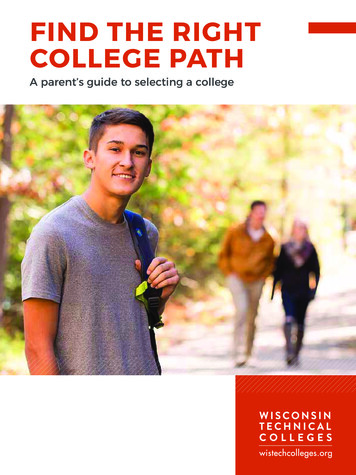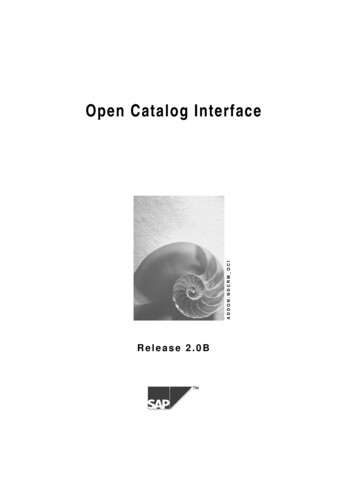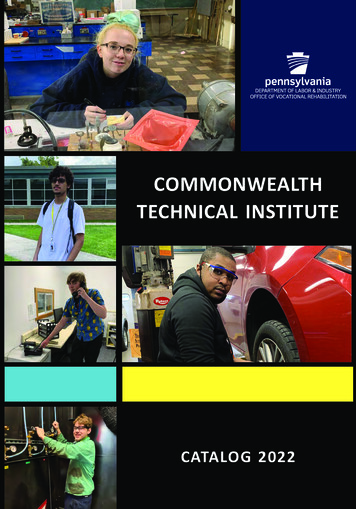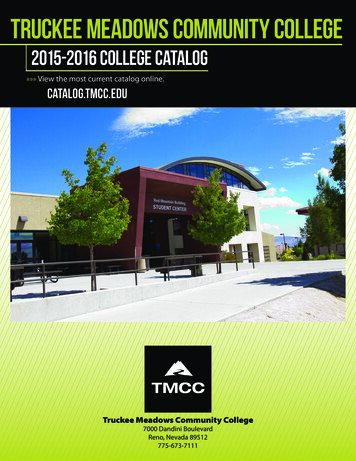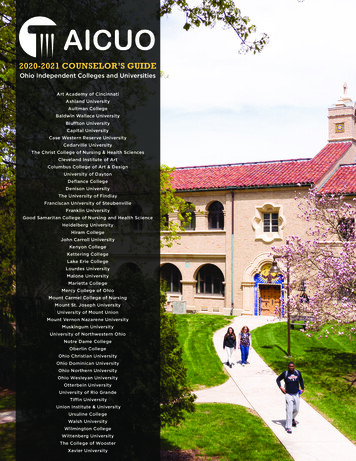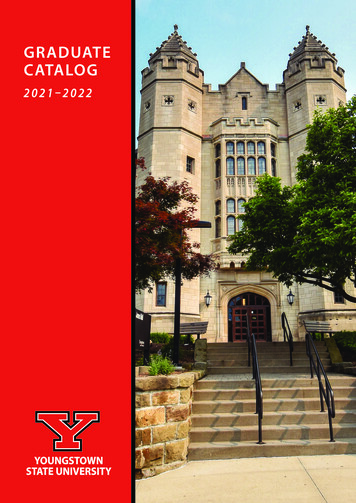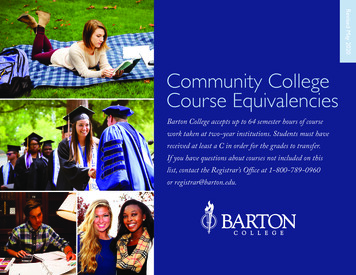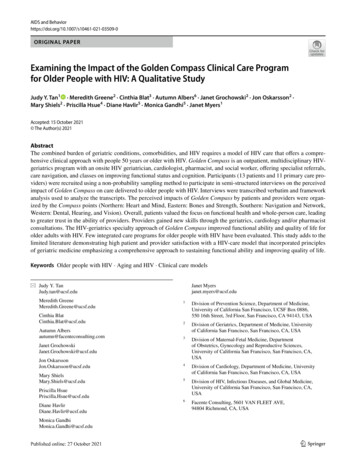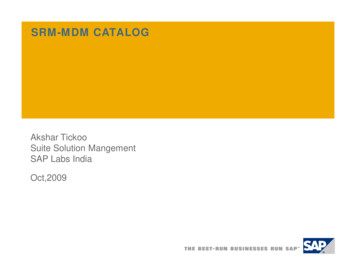
Transcription
Hiram College 2022-2023 CatalogEDUCATIONProgram Website: http://www.hiram.edu/education (http://www.hiram.edu/education/)Students interested in education have two options at Hiram College:majors that lead to teacher licensure in the state of Ohio or a liberalarts educational studies major/minor. Both programs offer students theopportunity to engage in rigorous coursework and experiences that willprepare them for challenges faced by education and educators of the21st century. Hiram College recognizes that while the traditional teachinglicense meets the interests of many students, others may wish to pursuecoursework in education that will allow them to understand and applyeducational theories in a wide variety of settings.FacultyRichard O Garris, III, (2021) Assistant Professor of EducationB.S., M.S., California University of Pennsylvania;Ph.D., Robert Morris Universitygarrisro@hiram.eduKathleen E Maretka, (2012) Director of Student Teaching and FieldExperienceB.S., Baldwin Wallace College;M.A., Cleveland State Universitymaretkake@hiram.eduJennifer McCreight, (2011) Director of the School of Health, Education &Society; Associate Professor of Education; Head of Teacher EducationB.A., Hiram College;M.Ed., Georgia State University;Ph.D., University of Georgiamccreightja@hiram.eduKelly NewVine, (2013) Associate Professor of EducationB.A., M.Ed., Doane College;Ph.D., Kent State Universitylewiska@hiram.eduRoxanne Sorrick, (2001) Professor of EducationB.A., Hiram College;M.Ed., Kent State University;Ed.D., Walden Universitysorrickr@hiram.eduCourse DescriptionsEDUC 10200: TEACHER LICENS POLICIES/PROCED: 1 Hour(s)TEACHER LICENSURE POLICIES AND PROCEDURES Participants inthis course will examine policies and procedures for teacher licensurein the state of Ohio, and specifically at Hiram College. Issues pertinentto teacher licensure, such as career options of educators, certificationin states other than Ohio, and Pearson testing requirements, will bediscussed. Participants will complete an application to Hiram's teacherlicensure program and will initiate other aspects of the licensure process.This course is a requirement for every student seeking teacher licensure,and must be taken during the first term they wish to apply to HiramEducation Department's program. This course is offered on a Pass/NoCredit basis only.Education1EDUC 10700: ENTREPRENEUR THRU EDUCATION:ES: 4 Hour(s)EXPLORING INTERSECTIONS-EXAMINING ENTREPRENEURSHIPTHROUGH AN EDUCATIONAL LENS:ES This course will examineopportunities for intersecting education, entrepreneurship, andsocial issues. It will explore the educational slant of certain socialentrepreneurship and non-profit ventures, and will consider the strengthsand challenges of each approach. Students will ethically consider howorganizations may impose a particular worldview and the potentialimplications of this worldview on those they serve and those they areeducating, understanding that no educational tool or strategy is free ofspecific ideologies or values. Students will also develop and implementan educational plan/application of learning to support Hiram College'sown student run venture (focusing on fair trade goods) by designingeducational events around the merchandise in the store. This course isalso listed as ENTR 10700. This course is aligned with the EducationalStudies Major/Minor Program Goals and Outcomes. This course countstoward the entrepreneurship minor.Core: Meaning/Ethics/Soc ResponsibilEDUC 12000: PERSONAL COMM HEALTH P12:ES: 3 Hour(s)PERSONAL AND COMMUNITY HEALTH ISSUES PREK-12:ES Thiscourse examines the myriad issues of personal and community healthimpacting PreK-12 students of the 21st century. Topics such as abuseand neglect, major childhood illnesses and communicable diseases,and recommendations for appropriate nutrition, immunizations andhealth practices for appropriate development will be discussed.Additionally, this course will explore urgent issues impacting childrenand adolescents including /opioid education and abuse, communityand school violence, suicide awareness and prevention, bullying andconflict resolution and teacher understanding of aggressive, risk-taking,and/or anti- social behaviors. Aspects of trauma-informed teaching andresponsive classroom practices will provide an over-arching frameworkfor the course. The intent of this course is to prepare educators towork proactively to understand, identify and respond to the personaland community health factors that impact academic achievement andsuccess.Core: Meaning/Ethics/Soc ResponsibilEDUC 15000: EDUC CULTURE & SOCIETY:CA,UD: 4 Hour(s)EDUCATION, CULTURE & SOCIETY:CA,UD This course is designedto introduce students to the issues related to teaching the wideningdiversity of students to be found in schools and communities acrossthe United States. Students become familiar with the knowledge base,skills, and dispositions that are necessary to offer equal educationalopportunity for all children and adolescents. The course examines theimpact that human difference has on educational policy and practice, aswell as the relationship of cultural values to the formation of a teacher'sprofessional and personal self-concept and teaching styles. Fieldexperiences provide interactions with students in diverse schools.Core: Social/Cultural Analysis Meth; Understanding Diversity HomeEDUC 20100: EDUCATION AND US SOCIETY:ES: 4 Hour(s)EDUCATION AND U.S. SOCIETY This course examines the historical,philosophical and sociological foundations of education as sources forschool policies and practices. Students will explore multiple facets ofeducation in relationship to U.S. society and its constituent cultures, andwill research and discuss contemporary issues in education. Includesobservation at a variety of school and community sites. Some sections ofthis course may be considered service learning (SL).Core: Meaning/Ethics/Soc Responsibil
Hiram College 2022-2023 CatalogEDUC 20500: ENVIRONMENTAL EDUCATION: 4 Hour(s)ENVIRONMENTAL EDUCATION The goal of this course is to providestudents, including those interested in classroom and environmentaleducation, naturalists, and youth leaders, with the skills, experiences,and understandings necessary to help audiences interpret their naturalsurroundings and define their relationship and interactions with natureand the environment. This will be accomplished by emphasizing anunderstanding of natural history and fundamental environmentalconcepts, and providing opportunities to plan, teach and evaluatenature and environmental education based on best practices anddevelopmentally appropriate strategies. The James H. Barrow FieldStation and surrounding park districts and environmental educationcenters will be our classroom as we attempt to develop a foundation forconceptual understanding of environmental concepts. The course willfocus on environmental literacy and current research in environmentaleducation. Students will develop skills to foster learning throughexperiences teaching children, adults and families at the Hiram CollegeField Station, local schools and nearby natural areas. Assessment oflearning outcomes and program evaluation strategies will be practiced.Students will be certified to teach national curricula, such as projectWILD and Project WILD Aquatic. A segment of the course will be taughtat Hiram’s Northwoods Field Station in the Upper Peninsula of Michigan.Surrounded by 100,000 acres of national forest, lakes, streams and bogs,Northwoods provides the ideal location to develop a land ethic and reflecton the many ways people change nature and nature changes people. AtNorthwoods, we will live communally – sleeping in cabins – and each ofus will be responsible for camp maintenance, daily chores, and cooking.Field trip fee. This course is also listed as EVST 20500.EDUC 20600: PHONICS ELEM & MIDDLE GRADES: 3 Hour(s)PHONICS FOR ELEMENTARY AND MIDDLE GRADES This coursewill focus on the PreK-9th grade population and how typically andatypically developing students learn to read. Students will understandthe importance of phonics instruction in a balanced reading program.Multi-sensory methods of and strategies for phonics instruction will bediscussed as well as modeled by students in the course, focusing onthe alphabetic principle, phonological training/word-attack skills, wordrecognition, vocabulary, spelling, and writing, as well as assessment ofrelevant literacy skills. There will be a focus on the relationships amongphonemic awareness and graphophonemic, syntactic, and semanticcueing systems, and the role they play in developing competence inreading, spelling, and writing. This course will serve as a basis for studentunderstanding of the English language and its orthography.EDUC 20900: UNIVERSAL DESIGN:UD: 3 Hour(s)UNIVERSAL DESIGN:UD This course familiarizes students with theconcept of universal design and how it applies to the creation andredesign of commonly encountered situations and entities. UniversalDesign is an approach that considers accessibility and usability for thegreatest possible variety of people, disabled or not, without any specialadaptations or modifications. Students will learn about the diversityof experiences and capabilities that people have, including disabilities(e.g. physical, learning, and cognitive), learning styles, and culturalbackgrounds. After becoming familiar with how abilities vary, studentswill learn how to design/redesign products and environments in waysthat make these things available to the broadest group of people. Arevised version of this course is offered for 4 credit hours as EDUC 20910.Core: Understanding Diversity HomeEducation2EDUC 21500: UNDERSTANDING SCIENCE: 4 Hour(s)UNDERSTANDING SCIENCE This course is designed to provideelementary and middle childhood educators with a better understandingof science by integrating fundamental scientific concepts. Usingconcepts in earth, space, life, and physical science, as outlined by theNational Science Education Standards and the Ohio's current contentstandards, students will investigate the nature of scientific knowledge.The inquiry-based approach to learning will not only emphasize scienceprocess skills, but also model best practices for early and middlechildhood education. Students will work cooperatively to resolvequestions, experiment, and discuss interpretations and conclusions.Class activities will help students develop their technological designabilities, as well as gain insight into the historical and culturalcontributions of scientists who have provided us with a comprehensiveunderstanding of the natural world.EDUC 21600: EARTH & SPACE SCIENCE: 3 Hour(s)UNCOVERING EARTH AND SPACE SCIENCE This course providesa hands-on, field-based approach to learning about Earth and Spacescience. Through lectures, demonstrations, and field trips, students willdevelop a working knowledge of geology, including geologic history,plate tectonics, the hydrologic cycle and how thermal energy transfersthroughout Earth’s spheres. Also, the solar system and Earth-SunMoon complex with be explored. Field trips will allow us to explore localnatural resources to collect rocks and learn about geologic history andastronomy. Cross-listed with EVST 21600.EDUC 22900: DEV APPROP PRACT:BIRTH-10:UD: 4 Hour(s)DEVELOPMENTALLY APPROPRIATE PRACTICE: BIRTH TO TEN:UD Thiscourse will focus on the goal of developmentally appropriate practicein childcare settings, preschools, and elementary classrooms in thecontext of individual, family, program, and community diversity. Studentswill learn about various types of early childhood and elementary gradesprograms and planning/teaching strategies, and nationally recognizedpreschool program models. As they observe and work with infants,toddlers, preschool, and elementary children, Hiram students will learnabout developmental theorists and their ideas about how childrenlearn. Field experiences will develop knowledge of typical as well asindividual differences in development and learning across physical,cognitive, social-emotional, and language domains. The standards of theCouncil for the Accreditation of Educator Preparation, CAEP ElementaryStandards, NAEYC Standards, Ohio Common Core Standards, and theOhio Standards for the Teaching Profession and their application to bestpractices in creating healthy, respectful, supportive, and challenginglearning environments are included. Applicable standards and codesof ethics for other related disciplines/educational settings will also becovered. Field experience is required (EDUC 23000*). EDUC 23000* istaken concurrently with this course.Corequisite: EDUC 23000Core: Understanding Diversity HomeEDUC 23000: ELEMENTRY SCHOOL EXP AND LAB: 1 Hour(s)ELEMENTARY SCHOOL EXPERIENCE AND LAB The teacher candidatewill use the classroom observation experience as a basis for reflectingon practice. Guided reflections require candidates to apply theories ofelementary-aged development to classroom observation and interactions.In addition, candidates analyze the teaching process in the contextof individual, family, and community diversity. This course is takenconcurrently with EDUC 22900*. This course is offered Standard LetterGrade.Corequisite: EDUC 22900
Hiram College 2022-2023 CatalogEDUC 23100: HUMAN GROWTH/DEVELOP/LRNG:UD: 4 Hour(s)HUMAN GROWTH AND DEVELOPMENT AND LEARNING THEORY:UD This course examines human growth, development, and learningtheories through the use of readings, current research, and schoolbased experiences to develop knowledge about physical, cognitive,personal, social/emotional, and linguistic development from earlythrough late adolescence. Students will apply these theories in thecontext of individual, family, and community diversity, and learn howthey translate into education practice. Topics will include the roleof educational and psychological theory in schools, the learningenvironment (including classroom management), and motivation.Enrollment in the corresponding field experience (EDUC 23400 orEDUC 23500) is mandatory.Corequisite: EDUC 23400, EDUC 23500Core: Understanding Diversity HomeEDUC 23400: MID CHILD SCHOOL EXP/LAB: 1 Hour(s)HUM GROW & DEVELOP & LEARN THEORY MIDDLE CHILD & LAB: Theteacher candidate will engage in school-based classroom experiences asa basis for reflecting on practice. Guided reflections require candidatesto apply theories of young adolescent development to classroominteractions. In addition, candidates analyze the teaching process in thecontext of individual, family, and community diversity. EDUC 23400 istaken concurrently with EDUC 23100. This course is offered StandardLetter Grade.Corequisite: EDUC 23100EDUC 23500: ADOLESCENT SCHOOL EXP AND LAB: 1 Hour(s)HUMAN GROWTH AND DEVELOPMENT AND LEARNING THEORY:ADOLESCENT SCHOOL EXPERIENCE AND LAB The teacher candidatewill engage in school-based classroom experiences as a basis forreflecting on practice. Guided reflections require candidates to applytheories of adolescent development to classroom interactions. Inaddition, candidates analyze the teaching process in the contextof individual, family, and community diversity. EDUC 23500 is takenconcurrently with EDUC 23100. This course is offered Standard LetterGrade.Corequisite: EDUC 23100EDUC 24500: INTEGRAT TECH EDUC SPACES: 1 Hour(s)INTEGRATING TECHNOLOGY INTO EDUCATIONAL SPACES This coursewill focus on acquiring the current technological skills/mindset necessaryto engage 21st Century learners in today’s classrooms. Students willengage in such tasks as creating/implementing wikis, RSS feeds,podcasts, and blogs. They will work with learning tools like SmartBoards,iPads, and iPods. Video creation, editing, and compression skills willalso be covered. Throughout the course itself, students will engage indiscussions and personal reflection around how these technologicaladvancements may be changing the way students learn, and how toadapt their instructional strategies to meet the needs of those they teach.PERMISSION ONLY: when students are enrolled in/have already takenEDUC 23100 or EDUC 23200.EDUC 24600: ISS CONTENT: 3 Hour(s)INTEGRATED SOCIAL STUDIES CONTENT This course will be a surveyof U.S. History, Ohio History and World History based on Ohio Departmentof Education curriculum standards. Students will study the growth anddevelopment of Ohio as connected to the growth and development of theUnited States. Development of the Western Hemisphere will be analyzedin terms European exploration and colonization. World Geography willbe studied in context of history related to the movement of people andregions across the globe. Students will study human systems, physicalcharacteristics of the environment and change over time. This course isfor P-5 elementary and middle childhood licensure students only.Education3EDUC 25300: READING/WRITING CHILD LIT:IM: 3 Hour(s)READING,WRITING, AND RESPONSE WITH CHILDREN'S LITERATURE:IM Reading strategies based on authentic reading tasks includingcomprehension, vocabulary, word identification, and writing for bothnarrative and expository texts are taught through an exploration oftraditional and modern children's literature, including multiculturalliterature, poetry, fiction, non-fiction, informational, and technology basedselections. The goal of this course is to expose students to a varietyof written materials, strategies, and methods that they may use in theteaching of reading in a classroom. Includes observation and practice ata school site.Core: Interpretive MethodsEDUC 25400: TEACHING READING/ADOL LIT:IM: 3 Hour(s)TEACHING READING WITH ADOLESCENT LITERATURE:IM Thiscourse will comprise a survey of traditional and modern literature foradolescents, across genres with emphasis on reader-response andtransactional theories of reading using quality adolescent literature. Thisliterature will also be used to reinforce and apply reading concepts suchas pre-reading, comprehension, and assessment strategies. Additionalemphasis will include evaluating and selecting a wide range of literatureto meet the needs and interests of adolescent students of diversebackgrounds and abilities, as well as the role of high-quality adolescentliterature in interdisciplinary teaching strategies in both the middlegrades and high school.Core: Interpretive MethodsEDUC 28000: SEM:: 4 Hour(s)SEMINAR: EDUC 28100: INDEPENDENT STUDY: 1-4 Hour(s)INDEPENDENT STUDY EDUC 29000: ETHICS OF COLLABORATION:ES: 3 Hour(s)ETHICS OF COLLABORATION:ES This course will require studentsto intentionally consider possibilities for advocacy regarding ethicalinteractions and the empowerment of both their collaborative educationalpartners and themselves. Such ethical collaboration requires thoseinvolved to not only be aware of the perspectives others bring to thetable, but also of how their own background and experiences affectsthe way they interact with people. Students will work from the insideout, examining themselves as social beings situated in personalexperiences, considering the validity of others’ ways of meaningmaking, and acknowledging miscommunications that can arise incollaborative settings involving diverse participants. We will apply theseunderstandings as we consider how individuals might ethically constructdialogic working relationships as supervisor/supervisee, peer/peer,and community/organization partners in camps, daycares, hospitals,museums, schools, and more. Students will wrestle with the balancebetween dialogic relationships and an individual’s ethical responsibility towork against injustice, regardless of another’s cultural background. Somesections of this course may be considered service learning (SL).Core: Meaning/Ethics/Soc Responsibil
Hiram College 2022-2023 CatalogEducation4EDUC 29100: EXPERIENCES IN ENVIRO EDUCATN: 1 Hour(s)EXPERIENCES IN ENVIRONMENTAL EDUCATION This field experiencecourse requires 10 hours of training in environmental education programsofferings and 10 hours of Field Trip Program instructional experience.Understandings and experiences related to science include sensoryexplorations of the natural world, biomes, ecosystems, habitats, Ohioplants and animals, living and non-living factors, adaptations, biodiversity,ecology, and erosion. Additional experiences include cooperative learning,inquiry science explorations, program reflection and evaluation, and anunderstanding of age-appropriate activities. Schedule and hours will bedetermined by the instructor and each individual student's schedule. Thiscourse is offered as pass/no credit only.EDUC 32400: EXCEPTIONALITY:UD: 3 Hour(s)EXCEPTIONALITY:UD This course examines the philosophical,historical, legal, and ethical foundations of services for individuals withspecial needs. The characteristics, etiology, and socio-psychologicalimplications of exceptional conditions, including specific disabilities,gifts, and talents, are explored. Categorical and noncategoricalclassification systems; assessment, diagnosis, and evaluation; andeducational adaptations and assistive technologies, are included.Participants will explore the impact on families of disabilities at differentlife stages, from infancy and early childhood to adolescence andadulthood. Also listed as PSYC 32400.Core: Understanding Diversity HomeEDUC 29200: INTGRTD FINE ARTS/ERLY CHLD:CM: 3 Hour(s)INTEGRATED FINE ARTS FOR EARLY CHILDHOOD:CM This course isdesigned to develop the knowledge, skill, and dispositions to integratemusic, drama, art, and movement into the classroom curricula based onthe Ohio's current content standards, and the National Association for theEducation of Young Children (NAEYC) guidelines. Students will exploredifferent media employed in creating visual art, learn to move to musicand play simple instruments for accompaniment, and try out tellingstories with flannel boards, puppets, and theater games. Emphasis willbe placed on developmentally appropriate and individually appropriatecurriculum, as well as the role of the arts in speaking, listening, movementand play. Students will gain an intellectual understanding of the theorybehind the creative activities we employ in the classroom, and will havehands-on experience in the creation of their own art.Core: Creative MethodsEDUC 34000: CLASSROOM MANAGEMENT: 1 Hour(s)CLASSROOM MANAGEMENT: BUILDING EFFECTIVE LEARNINGENVIRONMENTS Effective classroom management is the key tocreating a learning environment where respect, cooperation, positivesocial behaviors, and motivation build a foundation for studentachievement. This course will explore research-based strategies formanaging the classroom, review research on development and learningthat affect the classroom environment, and allow candidates to developclassroom management models that fit the needs of PreK-12 classrooms.EDUC 29300: FIELD EXPERIENCE:PRE-SCHOOL: 1 Hour(s)FIELD EXPERIENCE:PRE-SCHOOL Pass/No Credit Only.EDUC 29600: FIELD EXP:MIDDLE CHILDHOOD: 1-4 Hour(s)FIELD EXPERIENCE MIDDLE CHILDHOOD Pass/No Credit Only.EDUC 29700: FIELD EXPERIENCE:ADOLESCENT: 1-4 Hour(s)FIELD EXPERIENCE ADOLESCENT Pass/No Credit Only.EDUC 29800: FIELD EXPERIENCE: 1-5 Hour(s)FIELD EXPERIENCE Pass/no credit only.EDUC 29900: FIELD EXP:P-5 ELEMENTARY: 1-4 Hour(s)FIELD EXPERIENCE:P-5 ELEMENTARY Pass/No Credit OnlyEDUC 30700: MIDDLE SCHOOL MATHEMATICS: 2 Hour(s)MIDDLE SCHOOL MATHEMATICS METHODS MATERIALS & MEANINGS Building on the basis of Fundamentals (MATH 10300 and 10400),Mathematical Modeling (MATH 16200), and Pre-calculus (MATH 19700),this course examines topics suitable for the middle grades and discussesways to teach them, ideas for alternative approaches, and appropriatematerials (from concrete to abstract). Topics include rational numbers,percent, probability, statistics, geometry (synthetic, transformational,coordinate), algebra, and triangle trigonometry. Ideas from OperationsManagement may be included. Integrates National Council of Teachersof Mathematics (NCTM) standards and Ohio's current content standards.Prerequisite: admission to the Teacher Education Program or permission,and EDUC 23100.Prerequisite: EDUC 23100EDUC 34200: ASSESSMENT FOR LEARNING: 4 Hour(s)ASSESSMENT FOR LEARNING This course examines the goals,benefits, and uses of developmentally appropriate assessment oftypically and atypically developing students. Students will learn aboutthe use of diagnostic, formative and summative assessments toevaluate and ensure the continuous cognitive, social/emotional, andphysical development of all students. Students will learn to designappropriate assessments and to collect and analyze data in order toplan effective instruction that advances the learning of each individualstudent. Legal and ethical issues in standardized assessment, aswell as basic statistical concepts needed to interpret standardizedtesting results, are included. This course emphasizes a collaborativeapproach to assessment, in partnership with learners, other professionalsand families within a context of familial, cultural, and social diversity.Prerequisite: Admission to the Teacher Education Program, EDUC 23100or 22900, or instructor permission.Prerequisite: EDUC 23100 or EDUC 22900EDUC 34300: DIAGNOSIS INTERVENTION P9: 3 Hour(s)DIAGNOSIS AND INTERVENTION IN P-9 LITERACY This course exploresformal and informal assessment as a critical part of classroom activitiesin reading and writing, for P-5 Elementary and Middle Childhood teachercandidates. Teacher-candidates will develop a knowledge base andpedagogical assessment skills to most appropriately diagnose andintervene to meet individual student’s literacy needs. The importanceof developing and maintaining relationships with students’ caregivers,as well as recognizing and building on their unique backgrounds, will beemphasized.
Hiram College 2022-2023 CatalogEDUC 35550: SCIENCE METHODS P5 ELEM: 4 Hour(s)SCIENCE METHODS FOR P-5 ELEMENTARY This course will examine,analyze, evaluate, and create developmentally appropriate, inquiry-basedscience curricula for pre-primary through elementary-aged childrenin accordance with guidelines established by the CAEP ElementaryStandards, NAEYC Standards, the Ohio Learning Standards, and theOhio Standards for the Teaching Profession. Curricular developmentwill be situated in the context of family and community, and will entailage appropriate and individually appropriate components. Pre-serviceteachers will practice implementation of curricula via instructionalpractices that are inclusive of children who are typically and atypicallydeveloping, through a continuous cycle of assessment, integratedcurriculum development, and instructional planning. Establishment oflearning environments that promote conceptual development in childrenthrough active learning is emphasized. Taken concurrently with SocialStudies Methods and Mathematics Methods for P-5 Elementary. Clinicalexperience is required. Prerequisite: Admission to the Teacher EducationProgram and permission.EDUC 35650: SOC STUDIES METHODS P5 ELEM: 4 Hour(s)SOCIAL STUDIES METHODS FOR P-5 ELEMENTARY EDUCATION This course will examine, analyze, evaluate and create social studiescurricula form elementary aged children in accordance with guidelinesestablished by the Ohio Learning Standards in Social Studies, the CAEPElementary Teacher Preparation Standards, NAEYC Standards, and theOhio Standards for the Teaching Profession. Curricular development willbe situated in the context of family and community, and will entail ageappropriate and individually appropriate components. Teacher candidateswill practice implementation of curricula via instructional practicesthat are inclusive of all students and which includes a continuouscycle of assessment, integrated curriculum development, instructionalplanning and reflection. Establishment of learning environments thatpromote conceptual development in children through active learning isemphasized. Clinical experience is required. Class will meet face-to-facefor all course hours. Students should expect to spend a minimum of 8-10hours per week on readings, assignments, and lesson planningEDUC 35750: MATH METHODS P-5 ELEMENTARY: 4 Hour(s)MATHEMATICS METHODS FOR P-5 ELEMENTARY This course willexamine, analyze, evaluate, and create developmentally appropriate,mathematics curricula for pre-primary and elementary-aged children(P-5) in accordance with guidelines established by the NationalAssociation for the Education of Young Children, the current OhioAcademic Content Standards, CAEP Elementary Standards, and theStandards for Ohio Educators. Curricular development will be situatedin the context of family and community, and will entail age appropriateand individually appropriate components. Pre-service teachers willpractice implementation of curricula via instructional practices that areinclusive of children who are typically and atypically developing, througha continuous cycle of assessment, integrated curriculum development,and instructional planning. Establishment of learning environments thatpromote conceptual development in children through active learning isemphasized. Clinical experience is required.Education5EDUC 36100: TEACHING RDG IN CONTENT AREA: 3 Hour(s)READING IN THE CONTENT AREAS This course is designed to providean overview of the reading process and factors that affect the middlelevel reader’s interaction with text. Examination of the Academic ContentStandards K-12 English Language Arts (Common Core) as a guideline forteaching reading in the middle level content areas, and of methods andmaterials that help readers to access texts, develop understandings ofconcepts and vocabulary, and gather, organize and present informationas well as assessment and intervention strategies appropriate to middlegrades will be included. Major topics will include comprehension,vocabulary development, writing across the curriculum, study skills, andassessment.EDUC 36200: MIDDLE SCHOOL LITERACY EDUCATN: 2 Hour(s)BEST PRACTICE IN MIDDLE SCHOOL LITERACY EDUCAT
M.Ed., Kent State University; Ed.D., Walden University sorrickr@hiram.edu Course Descriptions EDUC 10200: TEACHER LICENS POLICIES/PROCED: 1 Hour(s) . Hiram College 2022-2023 Catalog Education 2 EDUC 20500: ENVIRONMENTAL EDUCATION: 4 Hour(s) .
